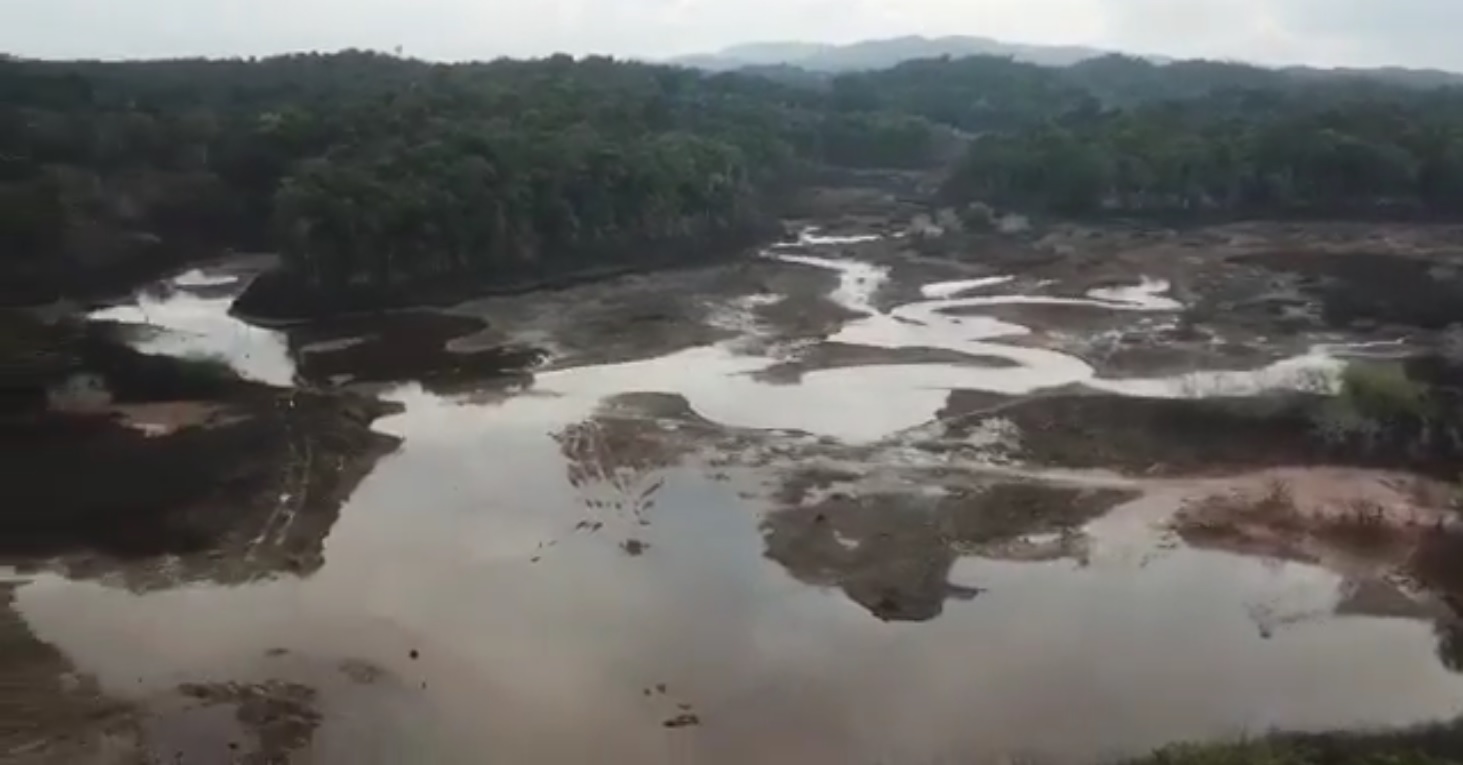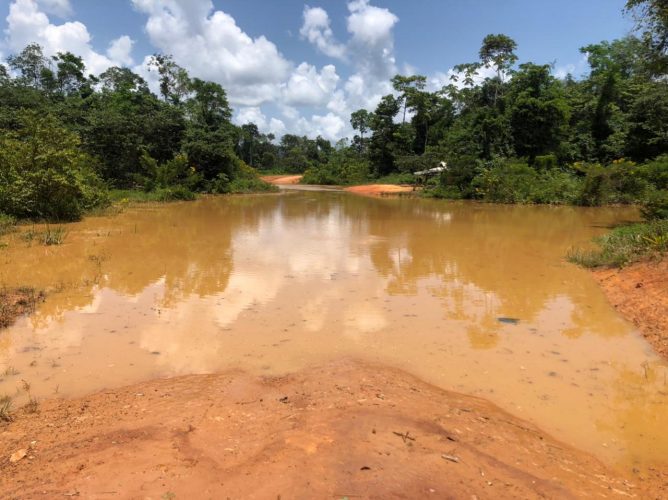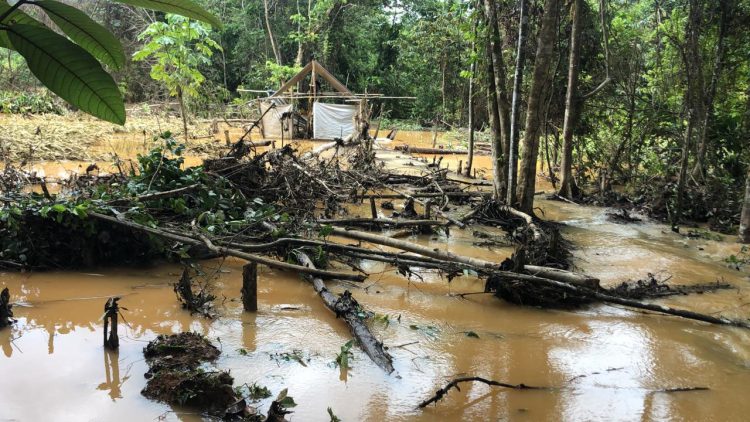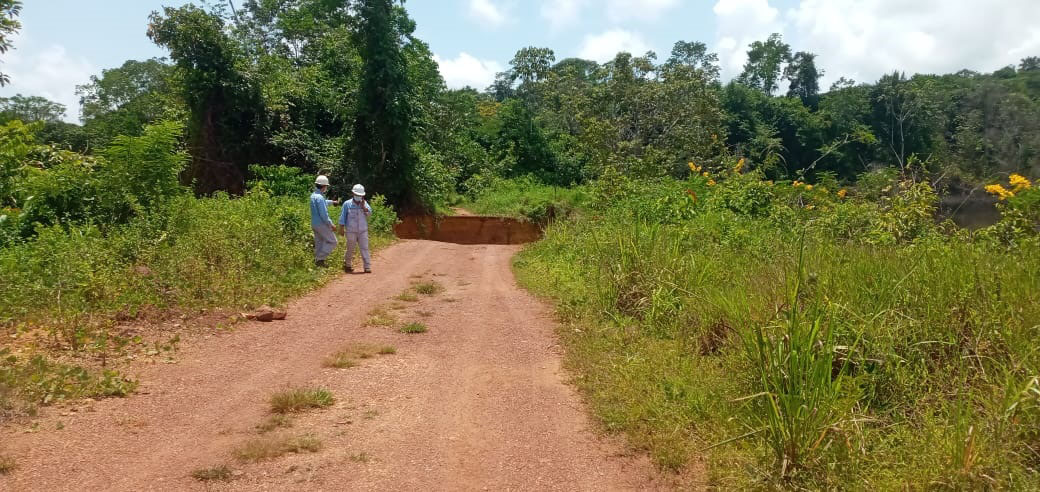Farms and several houses at Matthews Ridge in Region One have been left inundated after a reservoir belonging to Chinese-owned Guyana Manganese Inc (GMI) collapsed, releasing a torrent of water that forced some families to climb trees in order to survive.
At around 10:30 am yesterday, the GMI security guard alerted the residents of Matthews Ridge that part of the mining company’s reservoir had collapsed. Residents immediately gathered at the area but could do nothing to avert the disaster.

According to Regional Chairman Brentnol Ashley, when he visited the area it was still highly flooded and from the information he gathered only two families were affected. However, he noted that while several families were affected they did not have houses but camps. The company, he said, has promised to assist but nothing can be done until the water recedes.


“Nobody can get into Matthews Ridge or out of Matthews Ridge. And Matthews Ridge residents also purchase goods to go to Baramita and to other communities, and if there is any emergency to go to Kaituma, you have to use the same road but it is cut off at this time,” he said.
Ashley disclosed that so far he has been unable to speak to the company but hopes that once the water recedes he will be able to communicate with them.
“They will have to do some remedial works to assist the community and decide how they are going to address the issues of the families that are affected,” he added.
The collapse of the reservoir was not surprising to residents as they had already warned the company and the Neighbourhood Democratic Council (NDC) that this would happen. However, their warnings were not heeded and business continued as usual.
However, as they predicted, the reservoir collapsed, washing away about 20 feet of the public road, isolating the community and flooding several farms and homes that were in its way.
NDC Councillor Noreen Bess described the incident as a flash flooding. “We have a disaster right now,” she told Stabroek News. “Families had to be rescued and farms are destroyed.”
According to Bess, before GMI had begun mining for manganese, they were given permission to transform a recreational lake into a reservoir to wash mud off the ore.
The residents were not consulted.
Despite that, the reservoir was constructed and the company continued with business as usual.
One of the residents who was affected said it was unexpected, despite it being predicted. “It happened very suddenly. We had to think fast but we can swim so we held on to the trees to help us,” she recalled.
Her family was eventually rescued from the trees by GMI employees. This was also confirmed by Ashley.
Up to yesterday afternoon, Bess said, the water current was very strong and they had only managed to rescue one family.
Air-dashing
GMI, which had to be shut down after the sudden death of two of its workers and the air-dashing of 10 others to China in 2019, had its Environmental Impact Assessment (EIA) for the Region One project approved by the Environmental Protection Agency (EPA) in May of this year.
In a notice in the state-owned Guyana Chronicle newspaper, the EPA notified the public that the EIA for the mining of manganese by Guyana Manganese Inc at Matthews Ridge, had been approved.
It stated that the EIA has “fully complied with the Terms and Scope which were set by the EPA in consideration of the submissions made by members of the public.”
As such the company had begun mining activities in the region.
Bess revealed that apart from the family that was rescued, there are several families that would’ve been affected by the flooding but due to the force of the water, it was difficult to give an exact number. She did say however, that there were multiple farms along the way that are currently inundated.
In addition, a portion of the road which leads to Port Kaituma was washed away as a result of the breakage.
According to Bess, representatives of the company visited the area but did not say much, only that they would render some assistance.
Bess, too, remarked that the collapse of the reservoir was expected. “The water was reasonably high like 10 feet or more than what it was built to hold. I was saying that after I saw it and when the rain started falling, I spoke about it and because I did, everybody tried to make me the enemy but I asked them to release some of the water even if it was for an hour or two and then lock it. But they did not and this happened. They had only started to wash the mud off the manganese, when this happened,” she explained.
Another resident of Matthews Ridge, Carl Fraser, said that as a result of the situation, no one can access the community because of the washed-away road. He said that as a resident of the community, he made it his responsibility to highlight what the company was doing. According to Fraser, the condition of the reservoir was made known months before its breakage, but nobody took him seriously either.
He informed that the reservoir was constructed just a little over a year ago and now this incident shows that GMI did not do a proper job with their project. In fact, he says, when representatives of the company arrived on the scene they told persons not to take videos or pictures of what had happened.
As result, many persons stopped. “I only took four pictures because then the police came and told us the same thing so I moved,” he said.
Asked whether the residents were in agreement with the EPA’s approval for the company to mine in the area, Fraser said that he has no issue but alleged that the company has never fulfilled its corporate social responsibility as it said it would.
In fact, he says, they are not paying the road toll from the area to Port Kaituma, despite smaller business persons being required to do so.
Since the company has been in the area, he said, there has been no improvement yet they continue to use the roads and nothing is being done for residents of Matthews Ridge. “This is something we have to take seriously and we are but our voices are not being heard. Is not only today we talking about this. You can go and look on my [Facebook] page and see this is not a new issue,” he noted.
Unacceptable
Bess and Fraser both said that that residents are not against the company and its activities but the way the company treats residents is unacceptable.
“The community is not against the company mining and are glad that they are here but the only problem is that the treatment they are giving to the community. We the members are annoyed about it. We were trying to see how they would’ve done but they are here taking our manganese and not giving back to community. They are using the road but are not doing anything to maintain it,” Bess complained.
GMI was created in 2016, as a subsidiary of the Bosai Minerals Group of China, to invest in the resuscitation of manganese mining and processing in Matthews Ridge and export from Port Kaituma, the company’s profile states.
It says that the current investment will focus on the historic, previously mined sites located in Matthews Ridge. Ore mined and processed in Matthews Ridge would be transported overland to Port Kaituma for shipment to Trinidad and Tobago.
According to the EPA, the GMI has “adequately addressed” in the EIA, the views and feedback express-ed by the public during the statutory 60-day public review period.
A recommendation for approval also came from the Environmental Assessment Board and the EPA assured that the company’s EIA “has adequately assessed the potential adverse effects or risks posed by the project, and the Environmental Mitigation Plan proposed sufficient mitigation measure.”
In the EIA, GMI stated that it plans to invest US$75 million into the project to restart manganese mining in Guyana this year. “Mining will resume after rehabilitation of the previously mined site and infrastructure with the aim of producing 2.0 million tonnes of manganese ore annually for processing to turn out 500,000 tonnes of concentrates for intermediate shipment to Brighton Port, Trinidad,” the EIA states of the project plan.
In order to realise the project, GMI said that some 400 workers will be required over a one-year construction period, with 340 (85 per cent) being Guyanese, and the others being technical trainers and process specialists from China.
“At Port Kaituma, the construction of the Kaituma Marine Terminal will require approximately 200 workers over a 7-month construction period while project operation is intended to employ about 30 workers, of which 27 (90 per cent) would be Guyanese with the others being administrators and specialist technicians from China,” it added.
The extraction rates planned when related to current reserves yield a mine and project life of 13 years.
The mine was closed in March of 2019 when workers carrying out scoping works took ill and two – 47-year-old Zhenglong Zong, and 45-year-old Zengguo Ji, both Chinese nationals – subsequently died from what the company said was leptospirosis and respiratory failure.
A that time, seven workers were air-dashed to the city, where they were quarantined at the Georgetown Public Hospital (GPH) after experiencing flu-like symptoms, which led to the death of Zengguo at the Pakera District Hospital. An additional six workers were subsequently air-dashed to the city for treatment at the GPH and Zhenlong died while receiving medical attention there.
After the two workers succumbed, the Chinese government made a request for the 10 sick workers – all Chinese nationals – to be flown back home for medical attention. This request was granted and the men were flown back to their home country.










